学位英语复习资料:介词
英语介词知识总结归纳
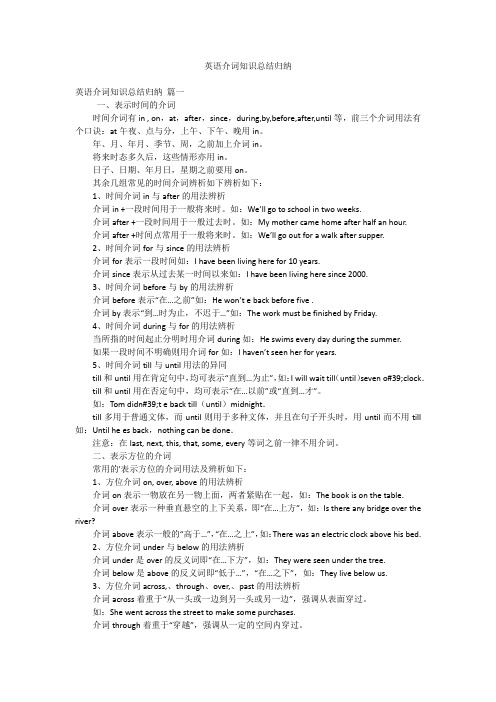
英语介词知识总结归纳英语介词知识总结归纳篇一一、表示时间的介词时间介词有in , on,at,after,since,during,by,before,after,until等,前三个介词用法有个口诀:at午夜、点与分,上午、下午、晚用in。
年、月、年月、季节、周,之前加上介词in。
将来时态多久后,这些情形亦用in。
日子、日期、年月日,星期之前要用on。
其余几组常见的时间介词辨析如下辨析如下:1、时间介词in与after的用法辨析介词in +一段时间用于一般将来时。
如:We’ll go to school in two weeks.介词after +一段时间用于一般过去时。
如:My mother came home after half an hour.介词after +时间点常用于一般将来时。
如:We’ll go out for a walk after supper.2、时间介词for与since的用法辨析介词for表示一段时间如:I have been living here for 10 years.介词since表示从过去某一时间以来如:I have been living here since 2000.3、时间介词before与by的用法辨析介词before表示“在…之前”如:He won’t e back before five .介词by表示“到…时为止,不迟于…”如:The work must be finished by Friday.4、时间介词during与for的用法辨析当所指的时间起止分明时用介词during如:He swims every day during the summer.如果一段时间不明确则用介词for如:I haven’t seen her for years.5、时间介词till与until用法的异同till和until用在肯定句中,均可表示“直到…为止”,如:I will wait till(until)seven o#39;clock.till和until用在否定句中,均可表示“在…以前”或“直到…才”。
学位英语课件-介词
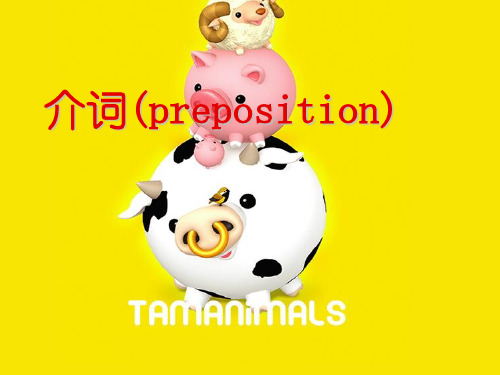
He spoke of this book the other day. 他 前些天提到这本书。
about on in
①表示“关于人或事 物的详细情形” ②作“关于”解
He talked about his family. 他谈到他 的家人。
①表示“论文;演讲 He has written a lot of books on the
介词(preposition)
▪ 介词是一种用来表示词与词, 词与句之间的 关系的词。介词后面一般有名词代词或相 当于名词的其他词类.
一.时间介词
1. in 年、月、季节及时间段(早、午、晚) on 具体某一天,星期、节日 at 钟点、节日、(一段时间)的起点
注意:at noon
在中午
at night
3.The teacher is writing on the paper __ red ink and the blackboard___a piece of chalk. A.with, with B. in ,with C.with ,in
4.Can you say it ___ English? A. in B. with C.by
after +时间段 在……之后, 多用于过去时
1. Mr Brown has gone to Canada.He will be back ___ two weeks.
A. for B. after C. in 2. Our manager came back ___ an hour.
A. in B. after C. at
You must write letters in ink. 你必须用墨水写信。
3 in 等动词通用; Can you answer it in
介词的考点归纳

介词的考点归纳-标准化文件发布号:(9556-EUATWK-MWUB-WUNN-INNUL-DDQTY-KII介词的考点归纳:(重点记忆一些方位介词、时间介词、方式介词及一些介词短语)介词是一种虚词,它不能单独担任句子成分,必须与名词或代词或相当于名词的其他词类、短语或从句构成介词短语,才能担任句子成分。
一、介词的种类和介词短语的用法1.介词的种类介词由词形上可分为简单介词和短语介词。
简单介词知识一个单词,如:in,on,after等。
短语介词是由两个以上单词集合而成,如:out of,in front of,because of,instead of等。
2.介词短语的用法①作定语介词短语作定语时,一律后置。
The book on the desk in mine.桌子上的书是我的。
He bought a house of five rooms.他买了一所有五个房间的房子。
A gentleman in white came into the hall.一个身穿白衣的绅士走进了大厅。
②作状语介词短语作状语时,修饰动词、形容词、副词或者整个句子。
Classes begin at eight.(修饰动词)八点钟开始上课。
Jane looks young for her age.(修饰形容词)珍妮看起来比她的实际年龄年轻。
The school is not far from my house.(修饰形容词)学校离我家不远。
To my surprise, Li Ming passed the exam at all.(修饰全句)使我吃惊的是,李明居然考试及格了。
③作表语He is in danger.他处于危险之中。
We are against/for you.我们反对/支持你。
It was because of the heavy rain, we couldn’t go out.因为这场大雨,我们出不去了。
介词怎么考知识点总结
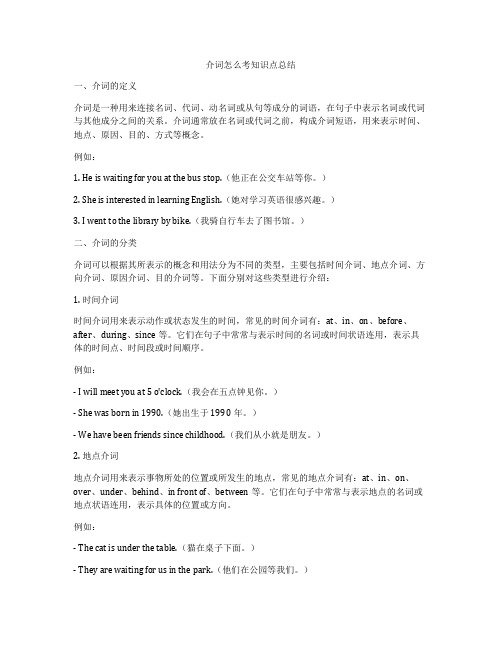
介词怎么考知识点总结一、介词的定义介词是一种用来连接名词、代词、动名词或从句等成分的词语,在句子中表示名词或代词与其他成分之间的关系。
介词通常放在名词或代词之前,构成介词短语,用来表示时间、地点、原因、目的、方式等概念。
例如:1. He is waiting for you at the bus stop.(他正在公交车站等你。
)2. She is interested in learning English.(她对学习英语很感兴趣。
)3. I went to the library by bike.(我骑自行车去了图书馆。
)二、介词的分类介词可以根据其所表示的概念和用法分为不同的类型,主要包括时间介词、地点介词、方向介词、原因介词、目的介词等。
下面分别对这些类型进行介绍:1. 时间介词时间介词用来表示动作或状态发生的时间,常见的时间介词有:at、in、on、before、after、during、since等。
它们在句子中常常与表示时间的名词或时间状语连用,表示具体的时间点、时间段或时间顺序。
例如:- I will meet you at 5 o'clock.(我会在五点钟见你。
)- She was born in 1990.(她出生于1990年。
)- We have been friends since childhood.(我们从小就是朋友。
)2. 地点介词地点介词用来表示事物所处的位置或所发生的地点,常见的地点介词有:at、in、on、over、under、behind、in front of、between等。
它们在句子中常常与表示地点的名词或地点状语连用,表示具体的位置或方向。
例如:- The cat is under the table.(猫在桌子下面。
)- They are waiting for us in the park.(他们在公园等我们。
)- The book is on the shelf.(书在书架上。
介词知识点归纳总结
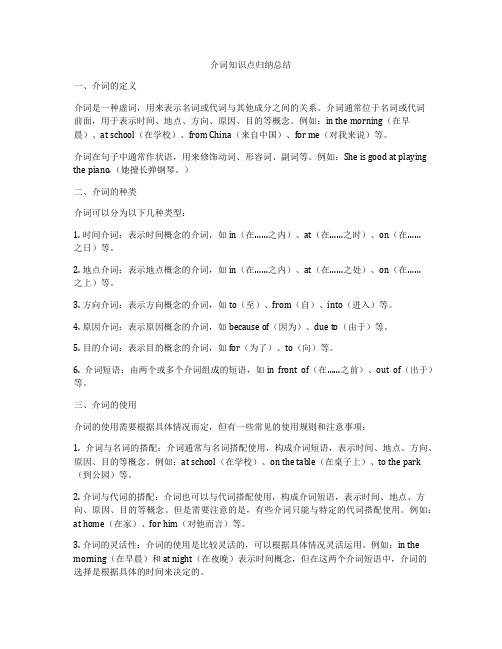
介词知识点归纳总结一、介词的定义介词是一种虚词,用来表示名词或代词与其他成分之间的关系。
介词通常位于名词或代词前面,用于表示时间、地点、方向、原因、目的等概念。
例如:in the morning(在早晨)、at school(在学校)、from China(来自中国)、for me(对我来说)等。
介词在句子中通常作状语,用来修饰动词、形容词、副词等。
例如:She is good at playing the piano.(她擅长弹钢琴。
)二、介词的种类介词可以分为以下几种类型:1. 时间介词:表示时间概念的介词,如in(在……之内)、at(在……之时)、on(在……之日)等。
2. 地点介词:表示地点概念的介词,如in(在……之内)、at(在……之处)、on(在……之上)等。
3. 方向介词:表示方向概念的介词,如to(至)、from(自)、into(进入)等。
4. 原因介词:表示原因概念的介词,如because of(因为)、due to(由于)等。
5. 目的介词:表示目的概念的介词,如for(为了)、to(向)等。
6. 介词短语:由两个或多个介词组成的短语,如in front of(在……之前)、out of(出于)等。
三、介词的使用介词的使用需要根据具体情况而定,但有一些常见的使用规则和注意事项:1. 介词与名词的搭配:介词通常与名词搭配使用,构成介词短语,表示时间、地点、方向、原因、目的等概念。
例如:at school(在学校)、on the table(在桌子上)、to the park (到公园)等。
2. 介词与代词的搭配:介词也可以与代词搭配使用,构成介词短语,表示时间、地点、方向、原因、目的等概念。
但是需要注意的是,有些介词只能与特定的代词搭配使用。
例如:at home(在家)、for him(对他而言)等。
3. 介词的灵活性:介词的使用是比较灵活的,可以根据具体情况灵活运用。
例如:in the morning(在早晨)和at night(在夜晚)表示时间概念,但在这两个介词短语中,介词的选择是根据具体的时间来决定的。
英语介词知识点归纳
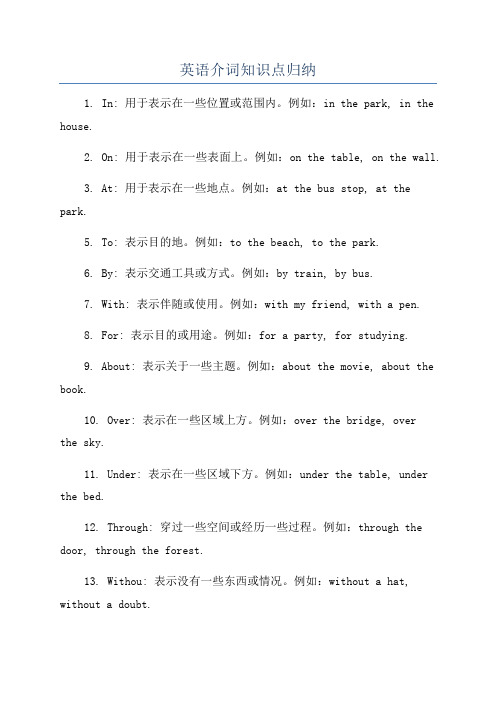
英语介词知识点归纳1. In: 用于表示在一些位置或范围内。
例如:in the park, in the house.2. On: 用于表示在一些表面上。
例如:on the table, on the wall.3. At: 用于表示在一些地点。
例如:at the bus stop, at the park.5. To: 表示目的地。
例如:to the beach, to the park.6. By: 表示交通工具或方式。
例如:by train, by bus.7. With: 表示伴随或使用。
例如:with my friend, with a pen.8. For: 表示目的或用途。
例如:for a party, for studying.9. About: 表示关于一些主题。
例如:about the movie, about the book.10. Over: 表示在一些区域上方。
例如:over the bridge, overthe sky.11. Under: 表示在一些区域下方。
例如:under the table, under the bed.12. Through: 穿过一些空间或经历一些过程。
例如:through the door, through the forest.13. Withou: 表示没有一些东西或情况。
例如:without a hat, without a doubt.14. Above: 表示在物之上。
例如:above the clouds, above the sign.15. Below: 表示在物之下。
例如:below the surface, below the line.。
学位英语考试必备之介词短语
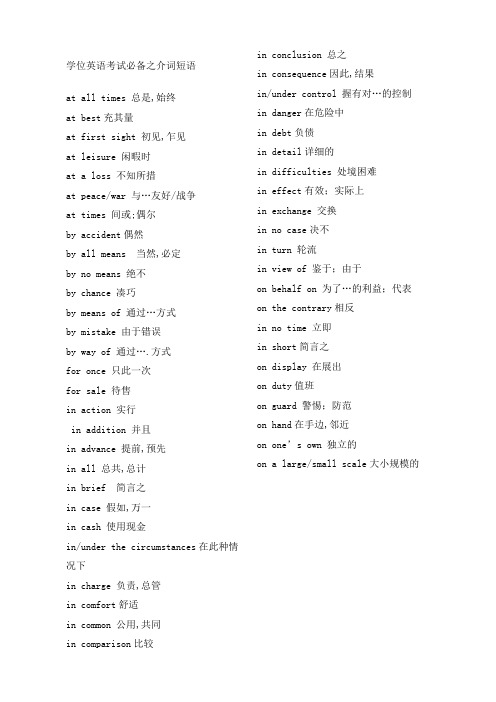
学位英语考试必备之介词短语at all times 总是,始终at best充其量at first sight 初见,乍见at leisure 闲暇时at a loss 不知所措at peace/war 与…友好/战争at times 间或;偶尔by accident偶然by all means 当然,必定by no means 绝不by chance 凑巧by means of 通过…方式by mistake 由于错误by way of 通过….方式for once 只此一次for sale 待售in action 实行in addition 并且in advance 提前,预先in all 总共,总计in brief 简言之in case 假如,万一in cash 使用现金in/under the circumstances在此种情况下in charge 负责,总管in comfort舒适in common 公用,共同in comparison比较in conclusion 总之in consequence因此,结果in/under control 握有对…的控制in danger在危险中in debt负债in detail详细的in difficulties 处境困难in effect有效;实际上in exchange 交换in no case决不in turn 轮流in view of 鉴于;由于on behalf on 为了…的利益;代表on the contrary相反in no time 立即in short简言之on display 在展出on duty值班on guard 警惕;防范on hand在手边,邻近on one’s own 独立的on a large/small scale大小规模的同义词近义词辨析108题1、a number of, the number ofa number of +可数名词,谓语用复数,意为许多,大量的……the number of +可数名词,谓语用单数,意为……的数目2、able, capable, competentable为常用词,指具有做某事所需的力量,技巧,知识与时间等,搭配是be able to do ;如:A cat is able to see in the dark. 猫在黑暗中能看见东西;capable 指满足一般要求的能力,搭配是be capable of +doing;competent 指“胜任”,“合格”,或受过专业技术等训练的,但不是超群的能力;如:A doctor should be competent to treat many diseases. 医生应该能治多种病;3、above all;after all;at all; in allabove all意为“尤其是”、“首先”、“最重要的是”,常位于句首或句中,作插入语,起强调作用;如:But above all tell me quickly what I have to do.可首先快些告诉我该做什么;after all意为“毕竟”、“终究”、“终归”、“到底”,在句中位置较灵活;可位于句首、句中或句末;如:After all,your birthday is only two weeks away.毕竟,两周后就是你的生日;He is,after all,a small child.他毕竟还是个小孩子;He failed after all.他终于失败了;at all用于否定句时,意为“丝毫;根本”,用于疑问句时意为“究竟;到底”,用于条件句时,常译为“当真;实在”;用于肯定句中,表示说话人的某种情绪或情感如怀疑或惊奇等,意为“竟然”等;如:He doesn’t like you at all.他根本不喜欢你;Are you going to do it at all你究竟做不做这件事If you do it at all,do it well.若你真要做这件事,就得做好;I was surprised at his coming at all.他竟然来了,我很惊讶;in all意为“总共”,既可放在句首,也可放在句末;如:There are 25,000 Inuit in all.=In all, there are 25,000 Inuit.这儿共有25,000因努伊特人;4、aboard, abroad, board, broadaboard 在船或飞机,车上;如:I never went aboard a ship.abroad 副词,在国外或海外;如:He often goes abroad.board 为动词,上船,飞机,车;如:The passengers are boarding the plane now. broad 为形容词,宽广的;如:He has very broad shoulders.5、accept, receiveaccept 接受,receive“接到”,“收到”;如:I received an invitation yesterday, but I didn’t accept it. 昨天我收到了一个请柬,但并没有接受邀请;6、accident, incident, eventaccident事故;如:a traffic accident 交通事故incident“附带事件”,在政治上特指引起国际争端或战争的事件,事变;event “事件”,指特别重要的事件,通常是由以前的努力而产生的结果,也指国家和社会的事件;7-accurate, correct, exact, preciseaccurate准确的,精确的;如:Clocks in railway stations should be accurate.火车站的钟应该是准确的;correct“正确的”,指符合一定的标准或准则,含有“无错误的”意味;它的反义词是incorrect, wrong.exact“精确的”,“恰好的”,比“大体上正确”更进一步,表“丝毫不差”;它的反义词是inexact;precise强调“精确”,“精密”;8、accuse, charge, sueaccuse 指责,指控,常与of 搭配;如:His boss accused him of carelessness. charge 常与with搭配;如:The police charged the driver with reckless driving.sue 常与for 搭配;如:Smith sued his neighbor for damaging his house.9、acquire, require, inquireacquire取得,获得,学到;如:acquire knowledge 获得知识inquire打听,询问;如:inquire a person’s name问一个人的姓名require需要;如:We require more help. 我们需要更多的帮助;10、adopt, adaptadopt 1收养;如:Since they have no children of their own, they decided to adopt a little girl. 他们自己没有孩子,所以决定收养一个小女孩;2采纳,采用,通过;如:He adopted our suggestion.他采纳了我们的建议;adopt与adapt词形相近,后者的意思是“使适合”,“改编”等;11、advantage, benefit, profitadvantage 常指一种使某人处于比其他人相对有利的地位,机会或时机;如:He had the advantage of good education. 受过良好的教育对他十分有利;profit 多指报偿或报偿性的收入;如Did you make any profit last year你去年赚钱了吗benefit 指物质利益或精神方面的好处;如:I get no personal benefit from the business.我个人从这家企业中并不获益;12、1affect, effectaffect影响动词;如Smoking affects health.effect效果,影响名词;如:Government policy will not have any effect on us.13、afford, provide, supply都有“提供,供给”的意思;afford一般只用于抽象事物;provide 和supply意思相同,两个词都和with连用,构成provide /supply somebody with something的结构;14、ago, beforeago表示以现在为起点的“以前”,常与一般过去时连用,不可以单独使用;before指过去或将来的某时刻“以前”,也可泛指以前,常和完成时连用,可以单独使用;例如,I saw him ten minutes ago.我十分钟之前看到的他;He told me that he had seen the film before.他告诉我他以前看过这场电影;15、agree on;agree to;agree withagree on作“就……取得一致意见”解;例如:The building of a new car factory was agreed on last month.上月,就建一座新汽车厂之事达成了协议;agree to有两层含义和用法:其一是to作为动词不定式符号,其后跟动词原形,作“同意答应做某事”解;例如: My father agreed to buy a new pen for me.父亲答应给我买支新钢笔;其二是to作为介词,之后跟表示“计划/条件/建议等一类的名词或代词”;例如:They have a greed to our plan.他们已同意我们的计划;agree with作“同意某人的意见”解,其后可跟表示人的名词或代词,也可跟表示“意见”或“说的话”的名词或从句;例如:He agreed with my opinions.他同意了我的意见;We agreed with what he said at the meeting.我们同意他在会上讲的话;16、alive, living, livealive 指虽有死的可能,但仍活着,一般只作表语;living可用于人或物,作定语时可前可后;live只做前置定语,用于动物和个别事物前;17、almost, nearly一般说来,almost比nearly 表示的意思更接近“开始”、“完成” 目标等;在all, every, always 前,两者都可用;如:He is almost nearly smoking. 他几乎每天抽烟;almost可同never, no, nobody, none, nothing 连用,而nearly却不能;如:Almost no one believed her. 几乎没人相信他;18、alone, lonelyalone只表“独自”的客观状态,没有感情色彩,只作表语;lonely表“孤独”,:“寂寞”,能作定语和表语;如:When she is left alone, she feels lonely. 剩下她一人时她就感到寂寞;alone, only均可表“只有”,但alone须置于被修饰词之后,only往往置于被修饰词前;如:He alone Only he can remember the story. 只有他才能记起这段经历;19、altogether, all togetheraltogether总计,总共;如:Altogether there are six of us. 我们总计六人; all together 全都在一起;如:We played the game all together. 我们大家都一起来玩游戏吧;20、although; though; as三者均可表示“尽管;虽然”,引导让步状语从句;although用法较正式,语气较强;though较常用;as则主要用于倒装句;它们的用法有如下几点值得注意:状语从句由although, though或as引导,主句之前不可有but, and, so, however等并列连词,但可有yet或still等副词;although与though常可互换;例如:Although/Though he believes it, yet he will not act.他虽然相信它,但却不肯有所行动;as表示“尽管;虽然”,只能用于倒装句,即:将表语、状语或谓语动词放在as之前;though也可这么用;例如:Young as/though he is, he knows a lot.他虽然年纪不大,却懂得很多; 注意:如果表语是单数名词,要省略a;例如:Child as/though he is, he can speak two foreign languages.虽然他是个孩子,但他会说两门外语;though可以放在句末,表示“但是”,although却不能;例如:They said they would come; they did not, though.他们说他们会来,可是他们并没有来;although只用来陈述“事实”,不能表示“假设”;因此可以说eventhough“即使”以及as though“好像=as if”,不能说even although或as although;例如:I believe you are on duty—even though you’re in plain clothes.尽管你穿着便衣,我相信你是在值勤;21、among, betweenamong 在……中间三者或三者以上之间;如:Our house is hidden among trees. between在两者之间;如:It is easy to distinguish between a Japanese anda Chinese.22、answer, reply, respond用作动词,都可表“回答”,“答复”;answer是常用词,后可接letter回信,question回答问题,doorbell开门,telephone接电话,advertisement应征广告等;reply较正式,一般只作不及物动词,可与to连用;如:He has replied to my letter.他回答了我信中提的问题;respond作“回答”解,用得较少,也同to 搭配;如:He quickly responded to the question. 他很快就回答了问题;另外,respond还可表“对……反应”,“响应”;23、approve, proveapprove1赞成,同意;如:I don’t approve of wasting time.我不赞成浪费时间;2批准,通过;如:The minister approved the building plan. 部长批准了建筑计划;prove和approve词形相似,prove是“证明”,“表明是”等;24、arise/rise/raise/ arousearise是一个不及物动词,意思是“起源于和from连用和“出现”;rise是一个不及物动词,意思是“上升”,该词是不及物动词:rise, rose, risenraise是一个及物动词,意思是“举起”;arouse的意思是“引起,导致”;Black smoke rose from the chimney.He is too weak to raise that heavy box.Accidents usually arise from carelessness .A crisis has arisen in their marrige.Matt’s behavior was arousing the interest of the neighbors.25、as so far as; as so long asassofar as的意思是“就……而言所知”,as so far as sth.is concerned 是其中一种具体用法,意为“就某事而言”;as so long as意为“只要”,引导条件状语从句;如:As far as I know, more than 10 million laid-off workers have found their new jobs.就我所知,一千多万下岗工人已经找到了新的工作;There is nothing that we can’t do so / as long as we keep on trying to do it.只要我们不断地努力去做,就没有什么事干不成;As far as the tourism of China is concerned, there is a long way to go.就中国的旅游业而言,需要做的工作还很多;26、as though;even though;thoughas though=as if,意为“好像;似乎”,引导方式状语从句或表语从句;如:He spoke as thoughas ifhe had been here before.他说话的口气好像他以前来过这里;It looks as ifas thoughit is going to rain.看起来好像要下雨;even though=even if,意为“即使”,引导让步状语从句;though也引导让步状语从句,意为“虽然”;even though有退一步设想的意味,与though不同;though引导的句子所说的是事实,even though引导的句子所说的则不一定是事实;例如:He will not tell the secret even thougheven ifhe knows it.即使他知道这个秘密,他也不肯说出来;He will not tell the secret though he knows it.他虽然知道这个秘密,但他不会说出来;27、assure, ensure, insureassure的意思是“使某人确信”,一般用作:assure sb. of /that…,后面不能直接跟that从句;ensure的意思是“保证”,后面可以接双宾语,也可以接that从句;insure的意思是“给…上保险”;例如:He assured me that it was true.We can’t ensure you a good post.My house is insured against fire.28、at the beginning;in the beginningat the beginning 在……初;在……开始的时候;常与of连用;例如:Students usually have a study plan at the beginning of term.学生们在开学初制定学习计划;in the beginning 相当于at first,表示“起初、开始”时,含“起初是这种情况,而后来却不是这种情况”之意,不与of连用;例如: In the beginning,some of us took no interest in physics.起初我们有些人对物理不感兴趣;29、at the time; at that time; at one time; at a timeat the time通常用于过去时句子中,指某件事情发生的“当时”、“那时”;例如:Many people saw the strange thing happen at the time.当时,许多人都看到了这件奇怪的事情的发生;有时,at the time的后面可接“of...”短语;这时,它表示“在某事态发生的时候”或“在……的时代”;例如:Were you in San Francisco at the time of the big earth quake in 1989﹖1989年旧金山发生地震时,你在那里吗at that time 则通常指前文明确提到的某个时期、时候;通常其后不带“of...”短语;例如:In the 17th century much corn was grown in Tibet and Sichuan.At that time =At the 17th century the land along the Changjiang River was becoming very crowded.at one time=during a period of time in the past意为“过去有一段时期”,“曾经”;例如:They used to be good friends at one time.他们曾经是好朋友;at a time则意为“一次”,表示一个时间单位;它常与表示数量的词语连用,表示频率;例如:Don’t speak all at once.One at a time, please.不要同时一起说;一次只一个人说;Take the medicine three times a day and three pieces at atime.这些药每天服三次,每次服三粒;30、awake, wake, waken都可作动词;awake既可及物,也可不及物,多用于比喻;wake常指“睡醒”,多为不及物动词;waken多用作及物动词,常指“吵醒”,“惊醒”;31、await, waitawait是及物动词;如:I await your further instructions.wait“等”、“等候”,是不及物动词,后常接介词for;如:I will wait for you at the school gate.32、award, prize, rewardaward, reward作动词;award意为“授予奖品,奖金等”,后面可跟双宾语;reward意为“报酬”,“酬谢”,只能跟人或以人的行为作宾语;award, prize, reward作名词时,award常指奖金,奖品;prize多指在竞赛、竞争中获胜所赢得的奖;reward则指为某项劳动或行为所付的酬金;33、because/since/as/for这四个词都是表示原因或理由的连接词,但是as,because,since是从属连词,引导原因状语从句,for是并列连词,所引导的不是原因状语从句,而是表示理由的对等句子,是对前面所讲内容补充和说明;在语气上由强至弱依次为because→since→as→for;because引导的从句多置于句末,表示直接的原因或理由,表示产生那种结果的必然的因果关系,在回答why的提问时,必须用because作答;如:We stayed at home because it rained.因为下雨我们呆在家里;as与since引导的从句多置于句首,不过as表示十分明显的原因,只说明一般的因果关系,可译为“因为、由于”;而since则表示稍加分析、对方已知的原因,一般可译为“既然”;如:As he was not feeling well,I decided to go there alone.由于他身体欠佳,我决定独自去那里;Since everyone is here,let's start.既然大家都到了,咱们就开始吧;for引导的从句一般放在句末,其前用逗号,它所叙述的理由是间接的,即推测性理由,或是对前面叙述的事实或看法的补充说明;如:There must be nobody in the classroom,for the light is off.教室里一定没有人,因为灯灭了;推测性理由34、beat, winbeat表在比赛和战斗中打败对手,后接对手作宾语;Win作及物动词时,其宾语为游戏、比赛、战斗、奖金等名词;如:He has won the race.他赢得了赛跑的胜利;35、beside, besidesbeside在……旁边;如:Come and sit beside me.besides除……之外;如:I have two other umbrellas besides this one. 36、besides;except;but三者都可以用作介词;用于肯定句中时,except/but意为“除……外不再有”;besides意为“除……外还有”;请比较:All of them have seen the film except/but Wu Dong.除了吴东外,他们都看过了那部影片;All of them have seen the film besides Wu Dong.除了吴东看过那部影片外,他们也都看过了;except后接名词、代词、-ing或不定式时,可以与but互换;except后接副词、介词短语时,一般不能为but所替换;如:I’ll do everything except/but cook.除了做饭,我什么事情都干;This window is never opened except in summer.除了在夏天,这个窗子从不打开;用在否定句中,三者可以互换;如:There aren’t any other people to do the work except/but/besides you.除了你,没人能做这工作;37、be known as; be known for; be known to; be known inbe known as 意为“作为……而着名”,其后的名词表示一个人的身份、职业等;如:Liu Huan is known as a singer.刘欢作为一个歌手而出名;We’re sure you’ll be well-known as an artist.我们相信你会成为一位着名的画家;be known for 意为“因……而着名”,其后所接内容表示某人或物的特点、特长等;如:Guilin is known for her beautiful mountains and rivers.桂林因其美丽的山水而闻名;Mr Geldof is well-known for organizing two big pop concerts on the same day.盖尔多夫先生因在同一天组织两场大型的流行音乐会而出名;be known to “为……所了解/知道”,其后接表示人的词语;“人们都知道”,其后接动词原形;如:He is known to all in our village.村子里的人都了解他;He was known to have invented many things.=It was known that he had invented many things.人们都知道他已经发明了很多东西;38、borrow, lendborrow借入;如:Can I borrow your pen for a momentlend把……借给;如:Can you lend me your bike39、bring/take/fetch/carrybring vt.带来:表示从别处把某人或某物拿到说话者处;take vt. 取走:表示将某物从讲话者处带走fetch vt. 去取:表示到某地将某物或某人拿到讲话者处;carry vt. 携带:表示用人力或交通工具把某物或某人,从一地带到另一地;该动词不含方向意味;The ball went over the fence and one of the players asked a boy to fetch it.The city’s underground carries more people than the buses.You had better take an umbrella with you in case of rain.Waiter, bring me a bottle of beer please.40、cause, reasoncause 指造成某一事实或现象的直接原因,后接of sth./doing sthreason用来解释某种现象或结果的理由,后接for sth./doing sth. the reason for being late41、chance, opportunity, occasionchance多指偶然的机会,意外的机会,带有侥幸的意味;如:Even so, it was a lucky chance that he could do it.即使如此,那也是他凭着侥幸才做到这点; opportunity主要指能够去做某事,尤其是达到自己目的,实现某种愿望的好机会;如:You should make the most of your opportunities of seeing thecountry and learning the language.你应该尽量利用你的机会去看看这个国家,学习它的语言;occasion主要指“时机”,“场合”,也含有“机会”的意思;如:The flags are hung out on the occasion of the National Day.每逢国庆节,国旗都悬持出来了;42、childish, childlikechildish幼稚的;如:It was very childish of him to lose his temper over something so unimportant.childlike孩子般天真的;如:When she won the gold medal, there was childlike smile on her face.43、cloth, clothingcloth布;如:I need three yards of cloth to make a suit.clothing衣服总称;如:You’d better give all the old clothing away. 44、compare…with; compar…to; compared with/tocompare…with意为“把……与……相比”,侧重指两者间的区别;如:Compare this car with that one, and you will find the differences between them.把这辆汽车与那辆汽车相比较,你就会发现它们之间的区别;compare…to…意为“把……比作……”,着重注意两者间的相似点;如:This song compares our country to a big family.这首歌把我们的国家比作一个大家庭;compare既可以单独用作及物动词,也可用作不及物动词;用作不及物动词时,以compare with…形式出现,表示“与……相比”;如:Living here can’t compare with living in Shanghai.在这儿生活不能和在上海生活相比;If you compare the two words, you can tell the difference between them.如果你比较这两个单词,你就会辨别出它们之间的不同;compared with…和compared to…都可用作状语,意义基本相同,可互换;如:Compared to/with him, you are lucky.与他相比,你是幸运的;It was a small town then, compared to/with what it is now.和现在比起来,那时它还是个小镇;45、compose, consist, constitutecompose为常用词,常用被动语态,如用主动语态,主语应用复数形式;如:Twelve men compose a jury.十二人组成陪审团;consist表一个整体由几个部分组成只能用主动语态;如:The United Kingdom consists of Great Britain and Northern Island.联合王国是由大不列颠及北爱尔兰组成;constitute为正式用词,与consist相反,表由哪些部分构成整体;如:Twelve months constitute a year.一年有十二个月;46、 considerable, considerateconsiderable相当多的,可观的;如:He met a considerable amount of trouble.他遇到了许多麻烦;considerate 考虑周到的,体谅的;如:It was considerate of you not to trouble us.你真体贴人,不打扰我们;47、 consistent, constant, continual, continuousconsistent一致的,符合的;如:His action is always consistent with his words.constant不断的,表示持续和惯常的重现,往往没有变化;如:He attributes his health to his constant exercise.continual频频的,不停的,时断时续,中间可有间歇;如:Continual smoking is bad for health.continuous不断延伸的,连续不断的,强调中间无间断;如:Everything in the universe undergoes continuous development and change.48、cost/take/spend/paycost vt.花费:指花费金钱、劳力和时间;主语通常是事或物,可跟双宾语; take vt. 花费:指花费时间;主语通常是一件事,也可以跟双宾语;spend vt. 花费:指花费时间和金钱,主语总是人;可以形成spend…on sth./in doing sth. 结构;pay vt.&vi. 付钱,后面可以跟双宾语,也可以当不及物动词使用,形成pay for sth.结构;比较:Electricity will cost more than it did last year.It will take me two days to finish the work.In the past few years the factory spent a lot of money improving its working conditions.Dick’s uncle has to pay for his education as his father has come down in the world.49、 crack, crashcrack使破裂,砸开;如:I can crack it, but I can’t break it. 我能把它弄裂,但不能把它弄破;crash摔坏,坠毁;如:The plane crashed shortly after the take-off.飞机起飞不久就坠毁了;50、 cure, treatcure治愈,医治;如:The medicine will cure of your disease.这药能治好你的病;cure表示治好,treat只表示“给……治病”;51、 current, present均可表“现在”,“目前”;current强调在现阶段正在流行,通用,但不一定是最新的;如:current English 当代英语present为常用词,指现在正在通用的,在时间上比current的范围更窄;如:What’s you r present address 你现住址是哪里52、 custom, habit均可表习惯;custom为正式用词,多指社团或人们的习惯行为方式;habit为常用词,多指个人因多次重复而形成做某事的趋势或意愿;如:He has the bad habit of biting his nails.他有咬手指的坏习惯;53、 damage; destroy; ruin这三个词都有“破坏;损坏”的意思,区别如下:damage意为“损坏、破坏”;它可用于表示损坏或破坏具体的物品,一般暗示损坏后价值或效益会降低,这种损坏是部分性的,通常指损坏的程度不那么严重,还可以修复再用;也可用于表示损坏抽象的东西,有时该词也用于借喻;如:The car was not damaged badly in the accident, but five people were seriously hurt.汽车在事故中损坏不严重,但却有五个人受了重伤;Her heart was slightly damaged as a result of her long illness.长期生病使她的心脏受到轻度损伤;What they said and did damaged the relations between the two countries.他们的言行损害了这两个国家之间的关系;Smoking has damaged his health badly.吸烟严重地损害了他的健康; damage还可用作可数或不可数名词;如:The earthquake did a lot of damages to the city.这场地震给这座城市带来了巨大的破坏;destroy意为“破坏;摧毁;消灭;毁灭”,通常指程度非常严重的“毁坏”,一般情况下不可以修复再用;另外,它既可表示毁坏具体的物品,也可表示毁坏抽象的东西;如:The big fire destroyed the whole house.这场大火把整座房子都烧毁了; The Nazi wanted to destroy people's hopes, but in the end what was destroyed was the Nazi's dream by the power of people.纳粹想摧毁人民的希望,最终是纳粹的梦想被人民的力量所摧毁;ruin多用于借喻之中,有时泛指一般性的破坏,指把某物损坏到了不能再使用的程度;如:My new coat is ruined.我的外套不能再穿了;The rain will ruin the crops.这雨会把庄稼毁掉的;I was ruined by that law case; I'm a ruined man我被那场官司毁了,我破产了;54、dependent, independentdependent依赖的,依靠的on, upon;如:Success is dependent on your hard work.Independent 不依靠的,独立的of;如:John was independent of his parents when he was still a child.55、discover, inventdiscover发现;如:A coal mine has been discovered in that area.invent发明,创造;如:A kind of toothbrush has been invented to relieve toothache.56、doubt/suspectdoubt意为怀疑某事是不可能或不真实的,肯定句中常跟whether或if引出的宾语从句,否定句和疑问句常跟that引出的宾语从句;翻译成“不相信”比较恰当;而suspect意为怀疑或认为某件事是真的;常跟that引起的宾语从句;翻译成“猜想…是真的”比较恰当;试比较:I doubt whether he is a genius.我看他未必是个天才;Do you doubt that he is a genius你怀疑他是个天才吗I suspect that he is a genius.我猜想他是个天才;57、effective, efficient均可表示“有效的”;effective常用以指物,强调能产生某种预期的效果;如:effective medicine, effective method等;efficient“效率高的”,“有能力的”,用以指人或物,着重有效地利用时间、精力并取得预期效果;如:The German telephone system is highly efficient. 德国的电话系统效率很高;58、economic, economicaleconomic经济学的;如:the economic doctrines of Ricardo李嘉图的经济学说economical节约的,节俭的;如:He is economical of money and time.59、 electric, electrical, electronic三词都与电有关electric着重于发电的,电动的或导电的;如:electric generator发电机;electric light电灯electrical多指本身不产生电,但是与电有关的;如:electrical engineering 电机工程;an electrical transcription广播唱片electronic 电子的,电子操作的;如:electronic engineering电子工程学60、emergence, emergencyemergence是emerge的名词形式;Emergency意为“紧急情况”,“突然事件”;61、everyday, every dayeveryday每日的,日常的作定语;如:This morning exercise has become my everyday routine.every day每天作状语;如:She gets up early every day.62、 endure, bear, stand, tolerate, withstand都表忍受,忍耐;bear忍受,容忍,指忍受使人悲痛、烦恼或痛苦的事情;如:It is hard to bear to be laughed at.被人取笑是难以忍受的;endure忍耐,书面语,指长时间经受痛苦而不屈服;如:It takes patience to endure hardships. 忍受苦难需要耐力;stand忍受,与bear同义,但较口语化;如:She can’t stand having nothing to do.没事干,她受不了;tolerate容忍,容许,指自我克制的态度,对于令人反感的事没有任何抗议;如:I can’t tolerate him if he goes on like that. 他如果继续这样下去的话,我决不会容忍他;withstand经受,承受,指顶住外来的压力和攻势;如:They have withstood all test.他们经受了一切考验;63、error, mistake, fault, shortcoming均表“缺点”,“错误”;error是通用词,指任何错误,“犯错误”可以说commit /make an error; mistake指判断或理解方面,或指因考虑不周而造成的错误,搭配是make a mistake;fault表示“过失”,可与error通用,现多用来指缺点,特指缺乏某要素因而不完美;如:There is a fault in this machine.这台机器有一处毛病;构成短语find fault with挑剔,找毛病;shortcoming 缺点,可指人或事物的本质上不足之处常用复数;如:In spite of his shortcomings, I still like him.尽管他缺点多,我仍然喜欢他;64、especially, particularly, specially均可表“特别地”;especially一般表示某事物在意义、程度、重要性性超过其他事物;如:I love Italy, especially in summer.我喜欢意大利,尤其在夏天;particularly往往着重说明与同类事物不同的个别事物;如:The visitors admired his paintings, but particularly the portrait of his daughter.来访者赞赏他所有的绘画,特别是他女儿的画像;specially 多表示“专门地”,“为特别目的的地”,如表“不寻常”,“过分”等,可与especially通用;如:I made chocolate cake specially for you.我特地为你做了巧克力蛋糕;65、fast, quicklyfast侧重于指人或物体具有运动速度快的特点,quickly侧重指某事完成或发生的快 run fast, answer the question quickly66、fit/suit。
各大介词知识点总结

各大介词知识点总结一、介词的定义和作用介词是连接名词、代词或动词等成分的一种虚词,用来表示名词、代词等在时间、空间、原因、方向等方面的关系。
介词通常放在名词、代词或动词的前面,起连接作用。
常见的介词有in, on, at, by, for, with, to, from, during, until等。
二、介词的分类1. 时间介词时间介词用来表示动作、状态发生的时间,常见的时间介词有in, on, at等。
其中in用来表示年、月、季节、一天内的特定时间,如in 1998, in April, in spring, in the morning等;on用来表示某天、某日、某个日期、某个节日、星期几、某个特定的时刻,如on Monday, on May 1st, on Christmas Day, on 7 o'clock等;at用来表示钟点、节日、特定的时刻、某个时期,如at 8 o'clock, at Christmas, at the moment等。
2. 地点介词地点介词用来表示名词、代词所处的地点或者方位,常见的地点介词有in, on, at, under, over, above, below, behind, in front of等。
其中in表示在某个范围内,如in the room, in China;on表示在某个平面或位置上,如on the table, on the wall;at表示在某个点或者位置,如at the bus stop, at the cinema;under表示在某个物体的下面,over表示在某个物体的上面,above表示在某物体的上方,below表示在某物体的下方,behind表示在某物体的后面,in front of表示在某物体的前面。
3. 方向介词方向介词用来表示名词或代词的方向,常见的方向介词有to, from, into, out of, towards, across等。
英语介词知识点的归纳

英语介词知识点的归纳(经典版)编制人:__________________审核人:__________________审批人:__________________编制单位:__________________编制时间:____年____月____日序言下载提示:该文档是本店铺精心编制而成的,希望大家下载后,能够帮助大家解决实际问题。
文档下载后可定制修改,请根据实际需要进行调整和使用,谢谢!并且,本店铺为大家提供各种类型的经典范文,如演讲稿、总结报告、合同协议、方案大全、工作计划、学习计划、条据书信、致辞讲话、教学资料、作文大全、其他范文等等,想了解不同范文格式和写法,敬请关注!Download tips: This document is carefully compiled by this editor. I hope that after you download it, it can help you solve practical problems. The document can be customized and modified after downloading, please adjust and use it according to actual needs, thank you!In addition, this shop provides you with various types of classic sample essays, such as speech drafts, summary reports, contract agreements, project plans, work plans, study plans, letter letters, speeches, teaching materials, essays, other sample essays, etc. Want to know the format and writing of different sample essays, so stay tuned!英语介词知识点的归纳介词又叫前置词,一般放在名词的前面。
学位英语复习资料:介词

学位英语复习资料:介词1.be + adj. + prep.be good at, be afraid of, be anxious about (of), be kind to, be fit for, etc. 2. be + v.-ed + prep.be satisfied with, be worried about, be surprised at, be pleased at (by)3. v. + prep.agree with (to / on), apologize for, arrive at (in), believe in, depend on4. v. + n. + prep.pay attention to, take part in, make use of, have a word with5. v. + adv. + prep.go on with, go in for, go ahead with, keep up with, make up for6. prep. + n. + prep.in charge of, in time of, in place of, on top of, at the end (edge) of7. out of + n.out of breath, out of control, out of date, out of sight, out of work (order) 8. n. + after + n.hour after hour, year after year, battle after battle, defeat after defeat9. n. + by + n.step by step, side by side, one by one10. n. + to + n.face to face, heart to heart11. n. + in + n.hand in hand, arm in arm12. from + n. + to + n.from side to side, from place to place, from door to door13. a + n. + ofa bit of, a great deal of, a few of, a drop of, a line of14. with + n.with a long history, with satisfaction (care), with pleasure, with one’s help 15. on + n.on a trip (journey), on a visit (to), on fire, on business, on sale, on watchon the team, on show, on duty, on foot16. without + n.without help, without mercy, without delay17. in + n.in silence, in danger (trouble, surprise, fear), in high spirits, in love (return) 18.as + n.as a matter of fact, as a rule, as a whole19. by + n.by now (then), by hand, by mistake, by this means, by chance, by the year 20. at + n.at sea, at sunset, at Christmas, at the doctor’s, at the station, at a time 21. for + n.for a moment, for a time, for ever, for example22. to + n. (…+ to )to one’s delight (joy, surprise), to the east (west), to the right, due to,thanks to, according to, to this dayEXERCISE 1 (单选)1. The home improvements have taken what little there is my sparetime. A. from B. in C. of D. at2. Nobody noticed the thief slip into the house because the lights happenedto . A. be put up B. give in C. be turned on D. go out3. Would you slow down a bit, please ? I can’t you.A. keep up withB. put up withC. make up toD. hold on to4. Your performance in the driving test didn’t reach the required standard--- , you failed. A. in the end B. after allC. in other wordsD. at the same time5. production up by 60%, the company has had another excellentyear. A. As B. For C. With D. Through6. She his number in the phone book to make sure that she had got itright. A. looked up B. looked for C. picked out D. picked up7. I don’t think I’ll need any money but I’ll bring some .A. at lastB. in caseC. once againD. in time (CDACCAB)8.The train leaves at 6:00 pm. So I have to be at the station 5:40 pmat the least. A. until B. after C. by D. around9. You’d better some money for special use.A. pick upB. set asideC. put offD. give away10. Readers can quite well without knowing the exact meaning ofeach word. A. get over B. get in C. get along D. get through11. If you keep on , you’ll succeed . A. in timeB. at one timeC. on the same timeD. on time12. We offered him our congratulations his passing the collegeentrance exams. A. at B. on C. for D. of13.--- Will somebody go and get Dr. White ? ---He’s already been .A. asked forB. sent forC. called forD. looked for14. I was tired climbing up the mountain, and I am tired havingthe same food every day.A. from, ofB. of, atC. in, ofD. at, with15. Rose was wild with joy the result of the examination.A. toB. atC. byD. as (CBCABBAC) EXERCISE 2 (改错,每句一错)1.There are some monkeys on anapple tree on which there are many apples.( in an apple tree)2. Water usually freezes when temperature is under zero and ice changesinto water again when the temperature rises above zero. (below zero) 3. Mr. Smith asked the students to retell the story with their own words.( in their words)4. In the end he told us the key to his success by winning the first prize.(in winning)5. Taiwan is in the east of Fujian and in the southeast of China. (to the east)6.In reaching the village, we were warmly welcomed by the villagers.(On reaching)7. The two girls were in the same age. (at the same)8. He drove away to the direction of London. ( in the direction)9. We shouldn’t judge a person with his looks and clothes. (by his looks)10. She has been teaching in this school from 1960. (since 1960)。
介词填空知识点归纳总结

介词填空知识点归纳总结一、介词的概念介词是一种虚词,用来表示名词、代词或动词与其他词语之间的关系。
介词通常放置在名词、代词或动词之前,用以说明它们在时间、空间、原因、目的等方面的关系。
例如:in, on, at, for, with, by等都是常用的介词。
二、介词的用法1. 表示时间关系介词常常用来表示时间关系,它可以表示具体时间、时间段、时间长度等。
例如:- We will have a meeting at 3 o'clock.- She has been working in the company for 5 years.2. 表示空间关系介词也常用来表示空间关系,它可以表示位置、方向、距离等。
例如:- The book is on the table.- He walked through the forest.3. 表示原因关系介词可以表示原因关系,指明某个动作或状态的原因。
例如:- He was late for the meeting due to the heavy traffic.- She is tired from working all day.4. 表示目的关系介词还可以表示目的关系,表达某个动作或状态的目的。
例如:- They went to the park for a picnic.- She is studying hard for the exam.5. 连接词语介词还可以用来连接两个或多个词语,形成短语,起到修饰或限定名词的作用。
例如:- A cup of tea- The keys to the car三、常见的介词1. 表示时间的介词- at:用于点的时间,如at 9 o'clock- on:用于具体的某一天或日期,如on Monday- in:用于月份、季节、年份等表示时间的词语前,如in July 2. 表示空间的介词- on:用于某个平面或表面,如on the table- in:用于封闭的空间内,如in the box- at:用于特定位置或点,如at the door3. 表示原因的介词- because of:表示某个动作或状态的原因,如because of the rain - due to:表示原因,常用于正式语言,如due to the bad weather 4. 表示目的的介词- for:表示某个动作或状态的目的,如for fun- to:表示接近的目的,如go to the park5. 其他常见介词- with:表示伴随、陪伴等关系- by:表示通过某种手段或方式- from:表示起点或起源- to:表示方向或目的地- of:表示所属关系或特征四、介词的错误使用在使用介词时,有些学生容易犯以下的错误:1. 错误理解某些介词的具体含义,如in和on的区分2. 不懂得介词的搭配,如动词和介词的搭配3. 不熟悉固定搭配,如名词短语和介词的搭配4. 没有注意介词的时态和语态问题为了正确使用介词,学生们需要多加练习,在实际的交流中多加注意,同时也需要加强对介词的掌握和记忆。
介词知识点总结文库
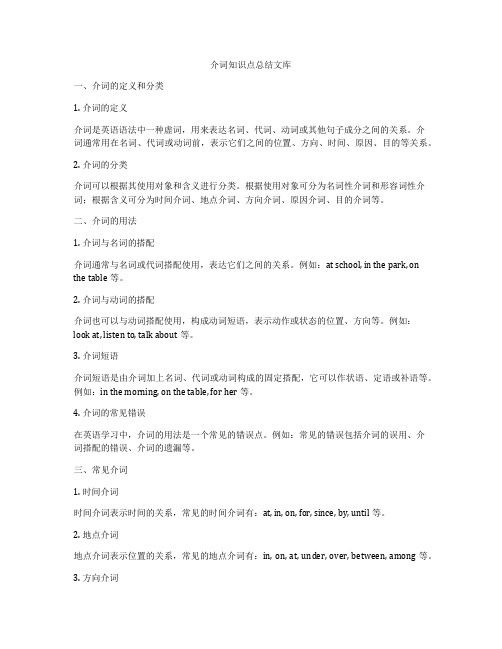
介词知识点总结文库一、介词的定义和分类1. 介词的定义介词是英语语法中一种虚词,用来表达名词、代词、动词或其他句子成分之间的关系。
介词通常用在名词、代词或动词前,表示它们之间的位置、方向、时间、原因、目的等关系。
2. 介词的分类介词可以根据其使用对象和含义进行分类。
根据使用对象可分为名词性介词和形容词性介词;根据含义可分为时间介词、地点介词、方向介词、原因介词、目的介词等。
二、介词的用法1. 介词与名词的搭配介词通常与名词或代词搭配使用,表达它们之间的关系。
例如:at school, in the park, on the table等。
2. 介词与动词的搭配介词也可以与动词搭配使用,构成动词短语,表示动作或状态的位置、方向等。
例如:look at, listen to, talk about等。
3. 介词短语介词短语是由介词加上名词、代词或动词构成的固定搭配,它可以作状语、定语或补语等。
例如:in the morning, on the table, for her等。
4. 介词的常见错误在英语学习中,介词的用法是一个常见的错误点。
例如:常见的错误包括介词的误用、介词搭配的错误、介词的遗漏等。
三、常见介词1. 时间介词时间介词表示时间的关系,常见的时间介词有:at, in, on, for, since, by, until等。
2. 地点介词地点介词表示位置的关系,常见的地点介词有:in, on, at, under, over, between, among等。
3. 方向介词方向介词表示方向的关系,常见的方向介词有:to, from, into, out of, through, across等。
4. 原因介词原因介词表示原因的关系,常见的原因介词有:because of, due to, owing to等。
5. 目的介词目的介词表示目的的关系,常见的目的介词有:for, to, in order to, so as to等。
介词知识点笔记总结

介词知识点笔记总结一、介词的定义介词是一种用来连接名词、代词或动名词等与其他词语之间关系的词类。
介词通常用来表示时间、地点、方向、原因等。
常见的介词有:in, on, at, under, above, with, of, for, to, from等。
例如:- He is in the room.(他在房间里。
)- The book is on the table.(书在桌子上。
)- She goes to school by bus.(她坐公交车去学校。
)二、介词的分类1. 时间介词时间介词用来表示时间的概念,常见的时间介词有:at, in, on等。
例如:- We have a meeting at 3 o’clock.(我们三点钟开会。
)- My birthday is in April.(我的生日在四月。
)- She will come on Monday.(她星期一来。
)2. 地点介词地点介词用来表示地点或位置的概念,常见的地点介词有:in, on, at, under, above, below, between, among等。
例如:- The cat is under the table.(猫在桌子下面。
)- The school is between the bank and the park.(学校在银行和公园之间。
)- She is among her friends.(她在她的朋友中间。
)3. 方向介词方向介词用来表示方向的概念,常见的方向介词有:to, from, into, out of等。
例如:- She goes to school by bike.(她骑自行车去学校。
)- He comes from China.(他来自中国。
)- The cat jumps into the box.(猫跳进箱子里。
)4. 原因介词原因介词用来表示原因或目的的概念,常见的原因介词有:for, because of, due to等。
学位英语考试语法

学位英语考试语法
学位英语考试语法部分主要考察的是学生对英语语法的掌握程度和应用能力。
下面列举一些常见的语法知识点:
1. 时态和语态:要求学生能够正确使用各种时态(如现在时、过去时、将来时)和语态(如主动语态、被动语态)。
2. 名词和冠词:理解名词的种类、复数形式,冠词的基本用法以及不使用冠词的情况。
3. 代词:能够正确使用人称代词、物主代词、不定代词等。
4. 形容词和副词:理解形容词和副词的用法,包括比较级和最高级的用法。
5. 介词:理解常用介词的用法,如in、on、at、by等。
6. 连词:理解常用连词的用法,如and、or、but等。
7. 主谓一致:理解主谓一致的规则,能够正确使用主语和谓语。
8. 虚拟语气:理解虚拟语气的用法,包括条件句中的虚拟语气和表示建议、要求、命令等的虚拟语气。
9. 非谓语动词:理解不定式、动名词和分词的用法。
10. 句子结构:理解简单句、复合句和并列句的构成,能够分析句子结构。
以上是一些常见的学位英语考试语法知识点,要求学生能够掌握并灵活运用。
同时,还需要注意语法规则在实际语境中的应用,提高语言运用能力。
学位英语语法基础知识大全

学位英语语法基础知识大全学位英语是为了满足研究生在论文写作方面的需要而设立的一门课程。
在学位英语中,语法基础知识是非常重要的一部分。
下面就是学位英语语法基础知识的大全。
1. 名词名词是一种表示事物、地点、人、抽象概念等的词汇。
名词可以分为可数名词和不可数名词两种。
可数名词具有单数和复数两种形式,而不可数名词只有单数形式。
2. 代词代词是用来代替名词或名词短语的词汇。
代词分为人称代词、物主代词、指示代词、疑问代词等。
3. 动词动词是表示动作或状态的词汇。
动词可以分为实义动词和助动词两种。
实义动词是指代表具体动作或情况的动词,而助动词则是指不代表具体行为或情况的动词,主要用于构成时态、语气、语态等。
4. 形容词形容词是用来形容名词或代词的属性和特征的词汇。
形容词可以分为原级、比较级和最高级三种。
原级是表示一般性的形容词,比较级是表示两者间的比较,而最高级则是表示三者或以上的比较。
5. 副词副词是用来修饰动词、形容词、其他副词或整个句子的词汇。
副词可以分为时间副词、地点副词、方式副词、程度副词等。
6. 冠词冠词是用来限定名词或名词短语的范围的词汇。
冠词可以分为定冠词和不定冠词两种。
定冠词是指“the”,用于特指某一特定的名词,而不定冠词则是指“a”或“an”,用于泛指某一个类别或实体。
7. 介词介词是用于连接名词或代词与其他单词之间的词汇。
介词可以分为时间介词、地点介词、目的介词、方式介词等。
8. 连词连词是用于连接词语、短语或句子之间的词汇。
连词可以分为并列连词、从属连词、反义连词等。
9. 感叹词感叹词是用于表示强烈感情、情感、惊讶等的词汇。
感叹词通常不作为句子的独立成分出现,而是与其他句子成分一起构成完整的句子。
以上是学位英语语法基础知识的大全,掌握这些基础知识,对于学术论文的写作大有裨益。
介词的总结归纳
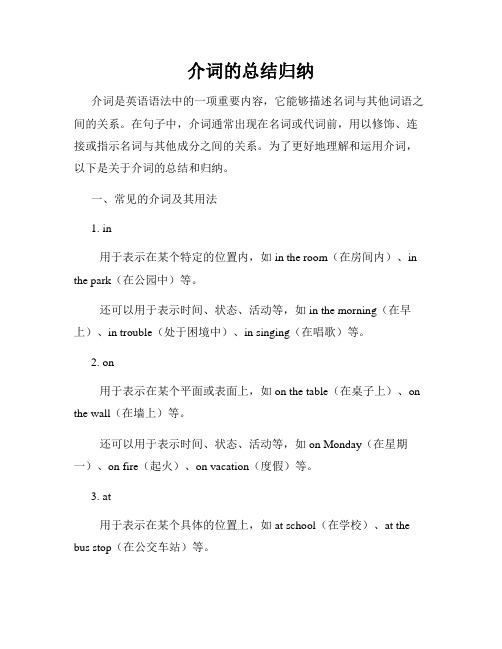
介词的总结归纳介词是英语语法中的一项重要内容,它能够描述名词与其他词语之间的关系。
在句子中,介词通常出现在名词或代词前,用以修饰、连接或指示名词与其他成分之间的关系。
为了更好地理解和运用介词,以下是关于介词的总结和归纳。
一、常见的介词及其用法1. in用于表示在某个特定的位置内,如 in the room(在房间内)、in the park(在公园中)等。
还可以用于表示时间、状态、活动等,如 in the morning(在早上)、in trouble(处于困境中)、in singing(在唱歌)等。
2. on用于表示在某个平面或表面上,如 on the table(在桌子上)、on the wall(在墙上)等。
还可以用于表示时间、状态、活动等,如 on Monday(在星期一)、on fire(起火)、on vacation(度假)等。
3. at用于表示在某个具体的位置上,如 at school(在学校)、at the bus stop(在公交车站)等。
还可以用于表示时间、活动等,如 at noon(在中午)、at a party (在派对上)等。
4. to用于表示运动的方向或目的地,如 go to school(去学校)、senda letter to her(给她发信)等。
还可以用于表示时间,如from Monday to Friday(从周一到周五)等。
5. for用于表示目的、原因或受益人,如 buy flowers for her(给她买花)、study for the exam(为了考试而学习)等。
6. with用于表示伴随、一起、使用等,如 go shopping with friends(和朋友一起去购物)、write with a pen(用钢笔写)等。
7. by用于表示通过某种方式或由某人完成某事,如 travel by train(乘火车旅行)、written by Mark(由马克写的)等。
英语介词知识点大全

③on Monday, on a warm morning
since
from
since指从过去到现在的一段时间,和完成时连用;
from指从时间的某一点开始。
①We have not seen each other since 1995.
②I hope to do morning exercises from today.
at the mercy of在……支配下;任由……摆布
for sale供出售
for rent供出租
within sight看得见
四. 容易混淆的介词固定搭配的词组
类型
举例
差一冠词,大相径庭
in front of(在……前面)——in the front of(在……前部)
in charge of(负责)——in the charge of(由……负责)
介词短语的功能
例句
作定语
They didn’t find the solutionto the problem.
作状语
We have breakfastat seven.(表时间)
They were late for the meetingbecause of the heavy rain.(表原因)
作宾语补足语
I found the old buildingin a bad condition.
三. 表示相同或相似概念的介词(短语)的区别
表示的概念
介词(短语)
区别
例子
时间
in
on
at
at在一个时间点上;
in在一段时间之内;
on在具体某一天或具体的上午、下午、晚上。
学位英语常考短语

学位英语常考短语—介词短语1.in return for 作为….的回报2. as a rule 通常、惯例3. for the sake of 为了4. on sale 有售5. on a large scale 大规模地6. in the long run 长期地7. on schedule 按预定时间8. in secret 秘密地9. in sequence 依次地10. in shape 处于良好状态11. at the mercy of 在…..的支配下12. the moment一…..就13. in nature 本质上14. on occasions 不时地15. in person 亲自地16. in place of 代替、取代17. at present 目前18. for the present 目前、暂时19. in public 公开地20. for the purpose of 为了21. at first sight 乍一看22. in sight 可看到的23. out of sight 看不到的24. in terms of 根据25. on second thoughts 又一想、转念一想26. at a time /at one time 一次/曾经27. for the time being 暂时28. from time to time 常常地29. in time 及时地30. on time 准时地31. in honor of 为了、以…..的名义32. in a hurry 匆忙地33. at intervals 间歇性地34. at length 详细地35. on purpose 故意地36. beyond question 毫无疑问确定无疑37. at any rate 无论如何38. at the rate of 以…..的速度39. by reason of 由于40. as regards 关于、至于41. with regards to 关于42. in relation to 有关、关于43. as a result of 作为….的结果44. on the top of 在…..之上45. in truth 实际上46. by turns 轮流地47. in turn 反过来48. by the way 顺便提一下49. in a way 在某种程度上50. word for word 逐字逐句地51. at work 在工作、忙于学位英语常考词组—名词词组1. by accident 偶然地2.in accordance with 与…一致3.on account of 因为4.in addition (to) 除了5.in advance 提前6.take advantage of 利用7.in agreement with 与…一致8.answer to 对…的回答9.an appetite for 对…的爱好10.on arrival 已到达11.out of control 失去控制12.in association with 与…相联系13.on the average 平均数14.on the basis of 在…基础15.on board 在船、飞机上16.on behalf of 代表17.(run) out of breath 跑得喘不过气来18.on business 忙于事业19.in any case 无论如何20.by chance 偶然,碰巧21.in case (of) 万一22.in charge of 负责23.around the clock 昼夜不停地24.in common 共同的,共有的25.in conclusion 最后,总之26.by comparison 与…相比较27.on condition that 如果,在…条件下28.in connection with/to 关于29.in consequence of 由于,因为…的缘故30.on the contrary 相反31.in contrast with/to 与…截然不同,形成对比32.in the course of 在…过程中33.at the cost of 以…为代价34.out of date 过时out of danger 脱离危险out of fashion 过时,不再时兴out of work 失去工作out of order 失去控制out of practice 荒疏out of question 毫无疑问35.in debt负债36.under discussion 处于讨论之中37.in detail 详细地38.in the distance 在远处39.at sb’s disposal 受到某人的摆布40.off earth 究竟41.in effect 事实上,实际上42.off duty 下班43.in the end 最终,终于44.at all events 无论如何45.in the event of 万一46.in essence 本质上47.with the exception 除了情况48.in excess 过度,超过49.to an extent 到达…程度50.face to face 面对面地51.in favor of 支持,有利于52.on fire 在燃烧53.in force 有效,在实施中54.in the future 未来55.on the grounds of 以…为理由56.on guards 警惕,防范57.hand in hand 手拉手58.at hand 在附近,即将到来59.at hear 内心里60.in honor of 为了,以…的名义61.in a hurry 匆忙地62.at intervals 间歇性地63.at length 详细地64.in the light of 依据,根据65.at a loss 不知所措地66.as a matter of fact 事实上67.bymeans of 通过…手段68.by no means 绝不69.in memory of 为了纪念…70.by mistake 错误的学位英语常考词组—形容词词组1.able to do 能够做2.about to do 打算做3absent from 缺席 4.abundant in 充足5.angry with/at/for 生气6.anxious for/about 焦虑7.applicable to 易于8.aware of 意识到9.bored with 厌倦10.amazed at 惊叹于11.faithful to 忠实于12.busy with 忙于13.caoable of doing 有能力做14.certain of 有把握15.characteristic of 特征是petent in 胜任的17.consistant with 一致的18.concious of/with 意识到19.contrary to 与相反venient to 便于21.critical of 对…挑剔ashamed of 对…感到羞耻22.harmful to 对…有害虫23.confident of/in 有信心24.dependent on 依靠于25.different from 不同26.eager for/to do 急于做27.enthusiastic about for 对…有热情28.equal to 等同于29.equivalent to 相当于30. essential to 重要的31.excited about./at 为某事而激动32.negligent of 对…马虎的33.famillar to/with 熟悉34.famous for 因…著名35.fit for/to 适合于36.fond of 喜爱37.free from 免于38.friendly to 对…友好39.guilty of 有…罪40.good at/in 善于good for 对…有益good to 对…友好往来41.happy about 为…而高兴42.loyal to 信守的43.regardless of 不顾44.relative to 与…有关,相对于45.representative of 有…代表性的46.resistance to 抵制的47.repsonsible for/to 对…负责的48.responsive to 响应的49.satisfied with 对…满意的50.separati from 与…分开的sensitive to 对…敏感的51.sick of 对…厌倦的52.helpful to 对…有帮助53.hostile to 对…的敌意的54.ignorant of 不了解55.innocent of无…罪的56.jealous of妒忌的57.keen on 热衷于cking in 缺乏59.likely to do 可能做60.opposite to 与…相对立的61.proud of 为…骄傲的62.patient with 对…耐心的63.preferable to 比…更可取64.previous to 在…之前65.prior to 在…之前,优先于66.proper to 特有的,专为…的67.proportional to 与…成比例的68.ready for 为…做好准备的69.similar to 与…相似的70.sorry about/for 为…感受到遗憾71.strict with 对…严格要求的72.suitable for/to 对…合适的73.subordinate to 从属于…,下级的74.superior to 优越于…75.thirsty for 对…渴望的76.typical of 有…典型性的77.worthy of 值得的78.popular with 受到欢迎的79.apploicable to 适用的80.doubtful about/of 怀疑学位英语常考动词词组1. fill in out 填写表格find out 查明,发现2. get/put across 解释清楚get along (with)与…相处get at 到达,知道,领会,意思指get away 走开,离开,逃脱get by 通过,过得去,过活get down 从…下来,写下get sown to sth. 开始,着手做get in 进入,参加,收获,收回,插嘴get by heart 记住,背诵get off 下车,动身离开get out of 逃避,逃掉get over 克服掉get rid of 摆脱get the best of 从中得到最大益处get the better of 占据上风,胜过get through 通过,完成,接通电话,花光钱get to 到达,触及 3. go into 详述,调查,研究,从事4. hand down 传下来,传给go off 不再喜欢,爆炸,成功进行hand in 上交go out 熄灭,停止运转,过时hand out 分发go over 仔细查看,检查hand over 移交,交付给go through 检查,经历,遭遇5. hang about/around 闲荡go up 上升,被炸毁hang on 等待片刻,抓紧不放go without 不享受,没有也无妨hang up 挂起来,挂断电话go wrong 出毛病6. head for 向…走去,驶向7. help oneself to 自取所需8. hold back 阻止前进,忍住,抑制9. impose on 强人所难,欺骗10. keep an eye on 留意照看keep back 隐瞒,保留,阻止keep down 限制,控制,降低keep off 使不接近,避开keep on 继续,反复地做keep to 遵守,信守,坚持stick to 坚持adhere to 坚持11. knock down 打倒,击倒knock out 打昏,击昏13. lay 置放,铺,设置,布置lay aside 放在一边,储蓄set aside 储蓄put aside 储蓄lay down 放下,规定,制订lay out 安排,布置,设计lay off 下岗,辞退14. leave alone 听其自然,别管15. lie in 在于hold on 握住不放16. line up 使排成行,排队hold onto 紧紧抓住17. live on (靠某人、某事)生活hold out 伸出,坚持要求,不屈live through 度过,经受过hold up 举起,耽搁live up to 遵守,不辜负期望18. look after 照料,管理,关心look at 看look back 回顾,回头看look down upon 看不起look for 寻找look forward to 期待着look in 顺道访问look into 调查,观察look on 参观look out 注意,留神look over 把…看一遍,温习,查看look through 浏览,通读look up to 尊敬,敬仰19. lose heart 失去信心leave behind 忘了带,留下leave for 动身前往产leave off 停止,中断leave out sth. 漏掉20. lend itself to 有助于,适合于21. let alone 别碰,别打扰,要不要说let down 让…失望let go of 放开,松手let in 容许进入,漏水,把衣服弄窄let loose 放松,释放let off 排放,放过,宽恕22. pass away 逝世pass out 失去知觉,昏倒23. pay back 偿还,回报,报复pay off 还清,得到好结果,取得成功pay up 拣起,中途搭人,学会24. play a joke on 和某人开玩笑play a part in 扮演角色,发挥作用play with a toy 玩弄,摆弄25. pull down 拆毁,拉侄,拉下,降低pull in (车船)进站pull off 脱衣等,实现pull on 穿、戴pull out 拔出,(车船)驶出pull up 使停下26. put across 解释清楚put away 放好,收好,储蓄put forward 提出计划、要求等put in 花费,付出时间,正式提出put off 推迟put on 穿上,增加体重put out 熄灭,公布,发布,生产出put up 建造,搭起,提供膳宿,张贴27. refer to 提及,参考28. regardless of 不顾,不管29. lose one’s head 不知所措lose one’s temper 发脾气lose one’s way 迷路lose the track of 失去对…的联系30. major in 主修make for 走向,导致,促成make sense 讲得通,有意义make up(for) 补偿,弥补make way for 开路,让路make from 由…制成31. mix up 混合,搞混32. object to 反对,不赞成33. occur to sb. 使某人想起34. remind sb of sth. 使某人想起35. resort to 诉诸于36. result in 导致后果result from 由于什么而造成37. ring off 挂断电话ring up 打电话给某人38. run away with (感情等)战胜,不受约束run down 贬你,减少,精疲力竭run into 偶然碰见run out of 用完,耗尽run over 碾过,很快看一遍run through 贯穿,济览,花光39. scale down 按比例缩小scale up 按比例放大40. see about 办理,安排see off 给送行see through 看破,识破see to 照料,注意,修理see to it that 务必做到…41. send for 派人去请,召唤send in 递送,提交send off 邮寄,发送42. serve as 作为,用作serve sb right 活该,罪有应得43. step in 齐步,合拍step up 加速44. stick to 坚持45. set about 开始着手做某事set aside 留出,储蓄set down 记下,写下,放下set apart 使分离民,使分开,拔出set fire to 放火烧set forth 陈述,阐明set off 出发[学位英语]语法常考词汇1.虚拟语气1)用于宾语从句,从句谓语用should + 动词原形或只用动词原形。
学位英语必备复习资料
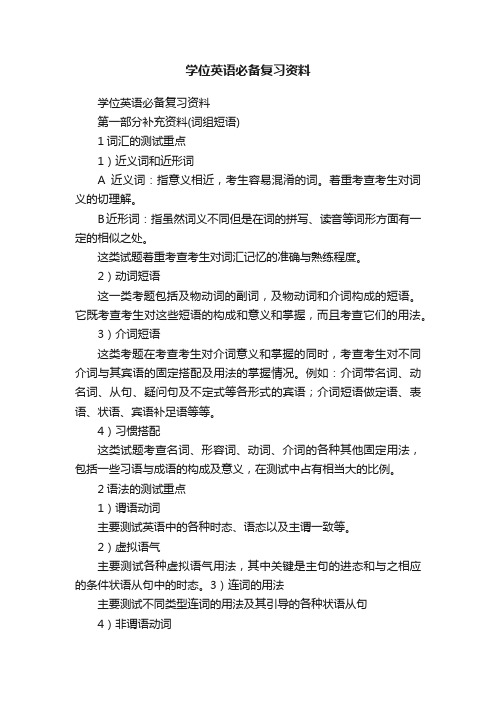
学位英语必备复习资料学位英语必备复习资料第一部分补充资料(词组短语)1词汇的测试重点1)近义词和近形词A近义词:指意义相近,考生容易混淆的词。
着重考查考生对词义的切理解。
B近形词:指虽然词义不同但是在词的拼写、读音等词形方面有一定的相似之处。
这类试题着重考查考生对词汇记忆的准确与熟练程度。
2)动词短语这一类考题包括及物动词的副词,及物动词和介词构成的短语。
它既考查考生对这些短语的构成和意义和掌握,而且考查它们的用法。
3)介词短语这类考题在考查考生对介词意义和掌握的同时,考查考生对不同介词与其宾语的固定搭配及用法的掌握情况。
例如:介词带名词、动名词、从句、疑问句及不定式等各形式的宾语;介词短语做定语、表语、状语、宾语补足语等等。
4)习惯搭配这类试题考查名词、形容词、动词、介词的各种其他固定用法,包括一些习语与成语的构成及意义,在测试中占有相当大的比例。
2语法的测试重点1)谓语动词主要测试英语中的各种时态、语态以及主谓一致等。
2)虚拟语气主要测试各种虚拟语气用法,其中关键是主句的进态和与之相应的条件状语从句中的时态。
3)连词的用法主要测试不同类型连词的用法及其引导的各种状语从句4)非谓语动词主要测试动词不定式、动名词、现在分词、和过去分词各自的用法。
其中重点是测试非谓语动词的时态和语态。
5)各种从句主要测试定语从句和名词性从句。
6)It句型主要测试“It”的不同用法,重点测试“It”作为形式主语、形式宾语、和用于强调结构的用法。
动词和短语1. Abide by遵守,承担11. approve 赞成,批准19. beat(in)战胜2. account for解释,说明可作及物动词win 赢得为某事负责,共计达approve of 赞成3. accuse sb. of指控某人做某事12. argue劝说说服;争论争辩20. be absorbed in 专心于charge with指控argue about 论争immersed in 沉浸于blame for指责argue against/for 赞成/反对indulged in 沉溺于Sentence判决argue into doing 说服某人做某事interested in 感兴趣于4. act行为,举动,动作13. arise from 由…引起21. be acquainted with 熟悉act as充当result from 由…引起22. be ashamed of 为…羞愧act on按…行事derive from 起源于23. be bound to 一定act 14. ask be destined to 注定act for 代理ask about sb. 问候某人be doomed to 注定5. adapt…to 适应ask for 请求见到be determined to 决心要adjust to 调整ask after sb. 问候某人be apt to 易于be accustomed to 习惯于15.associte…with 联想到一起be inclined to 倾向于be used to 习惯于connect 联结起来24. be build up of 由…制成6. add join 参与be made up of 由…组成add to 增加link 联结consist of/in 构成/在于add up to 总计为16. attach to 使附属于25.be supposed to 本应该7. adhere to 坚持17. attend 到场,出席26. bear in mind 牢记8. allow attend on sb. 服侍27. back up 支持allow for 把某事考虑进来attend to 照顾,办理28. believe in 相信allow of 允许(多用于否定)18. attribute to 归因于29. benefit from 获益于9. appeal owe to 归因于30.blow away 刮走appeal to 呼吁,请求ascribe to 归因于blow down 吹倒appeal for 请求支援contribute to 贡献于blow off 吹掉10. apply blow out 吹灭apply for 申请blow up 爆炸apply…to 将用于blow over 平息风暴,争吵31. break away with 脱离,逃跑35.call at停放,拜访某地break oneself of sth. 改掉本人的…call for, call for Mary要求,需要break the news to 泄露消息给…call forth引起break into tears 突然大哭call in来访break into a quarrel 突然大吵call off取消break into qieces 摔得粉碎call on拜访break into sb’s house 闯入某人家call up打电话break off/break out 断绝关系,结束/爆发36. care about看重某事,介意break through 突破care for喜欢,照顾,关心break up 打碎,散会,终止care to do sth喜欢,要32. bring about实现,使发生37.carry away拿走bring it along with sb随身携带carry forward推进,发扬bring down降价,使(政治团体)失败carry on继续bring in生产出,带入,提出carry through执行,贯彻指示bring forth使产生38.cast light on阐明bring back带回来,使恢复cast a glance at瞥一眼bring out说明,表现出,出版39. catch at 抓住(一根绳子/机会)bring up抚养,提出,呕吐catch hold of抓住33.burn down烧毁catch a glimpse of瞥见了burn up烧毁catch sight of看到了34. buy in大批买进某物catch onto理解,明白buy out买下全部股份catch one’s breath歇口气buy sth. for cash现金购买catch up with追赶上buy sth. on credit赊购come up with提出keep up with保持put up with容忍40. change改变48.cover up掩盖,掩饰change one’s mind改变主意49. cut across抄近路穿过,对直通过change sth with sb与某人交换某物cut back削减,急忙返回change sht for sth. 用某物换某物cut down削减,减少change into用某物换某物cut in插嘴,打断,超车41. charge转变成了,换上衣服cut off切断,阻断charge sb for充电,指控cut out割去,删去He will charge himself with that 50. deal with对付,处理,论述42.check in/out /up入住/离店/核对51. devote to致力于43. cheer up高兴起来dedicate to献给clear away清扫干净,天放晴52. die down变弱,逐渐消失44. clear打扫die out消失,灭绝clear away 清除掉die of死于clear up清扫干净53. dispose of去掉,销毁,处理clear out 清除出去,走开54. do away with废除,去掉45. come do without没有…也行,将就come about清除出去,走开have nothing to do with与…没有关系come across偶然碰到do good/harm to对有利/有害come around /round醒转过来do one’s best尽最大努力come into effect/operation生效/开始运行55.draw in(火车、汽车)进站come off发生,举行,脱落draw on临近,运用,利用come on到来,快点儿,进步draw up起草,制订,使停住56. drop by/in顺便访问come out出现,显露,出版,发表,结果come through活下来,成功drop off让…下车,睡着,下降come to 苏醒,总计为drop out退出,退学,离开come up to 比得上,符合57. be engaged in从事于46. convince sb of 使某人确信be engaged to和…订婚47. count on/count up指望/总计58. enjoy oneself玩得快乐59. experiment on 做…实验70. give away赠送,泄露60. expose sth to 将某物暴露于give back送还61. face up to正视,面对give in认输,放出,分发,用完62. fail in在某方面失败give off 散发出(气体)fail to do未能做某事give out 发出,放出,分发,用完63. fall 落下,跌倒,下降,减弱give rise to导致,引起fall back on求助于,转而依靠give up放弃fall behind落后give way to让路给,让位于,被替代fall in with 与…一致,符合,支持71. go after追求,设法得到fall through失败,落空go ahead开始,进行fall out with与…反目go along with赞同,支持64. feel for摸索,寻找go around/round流传,足够分配feel like意欲,想要go by 时间过去,遵守65. figure out算出,推测出go down 下降,减少,被接受work out算出,制订出,解出go for 支拿,袭击,目的在于make out分辨出go in for喜欢,致力于,从事66. full in out 填写表格go into 详述,调查,研究,从事67.find out 查明,发现go off 不再喜欢,爆炸,成功进行68. gain access to 获得go out 熄灭,停止运转,过时69. get/put across 解释清楚go over 仔细查看,检查get along(with) 与…相处to through 检查,经历,遭遇get at 到达,知道,领会,意思指go up 上升,被炸毁get away 走开,离开,逃脱go without 不享受,没有也无妨get by 通过,过得去,过活go wrong 出毛病get down 从…下来,写下72. handget down to sth. 开始,着手做hand down 伟下来,伟给get in 进入,参加,收获,收回,插嘴hand in 上交get by heart 记住,背诵hand out 分发get off 下车,动身离开hand over 移交,交付给get out of 逃避,改掉73. hang about/around 闲荡,逗留get over 克服掉hang on 等待片刻,抓紧不放get rid of 摆脱hang up 挂起来,挂断电话get the best of 从中得到最大益处74. head for 向…走去,驶向get the better of 占据上风,胜过75. help oneself to 自取所需get through 通过,完成,接通电话,花光钱76. hold back 阻止前进,忍住,抑制get to 到达,触及hold on 所至住不放,等一会儿hold onto 紧紧抓住hold out 伸出,坚持要求,不屈hold up 举起,耽搁77. impose on 强人所难,欺骗84. lie in 在于78. keep an eye on 留意照看85. line up 使排成行,排队keep back 隐瞒,保留,阻止86. livekeep down 限制,控制,降低live on (靠某人某事)生活keep off 使不接近,避开live through 度过,经受过keep on 继续,反复地做live up to 遵守,不辜负期望keep to 遵守,信守,坚持87. look after 照料,管理,关心stick to 坚持look at 看adhere to 坚持look back 回顾,回头看79. knock down 打倒,击倒look down upon 看不起knock out 打昏,击昏look for 寻找80. lay 置放,铺,设置,布置look forward to 期待着lay aside 放在一边,储蓄look in 顺道访问set aside 储蓄look into 调查,观察put aside 储蓄look on 参观lay down 放下,规定,制订look out 注意,留神lay out 安排,布置,设计look over 把…看一遍,温习,查看lay off 下岗,辞退look through 游览,通读81. leave look up to 尊敬,敬仰leave alone 听其自然,别管88. lose heart 失去信心leave behind 忘了带,留下lose one’s head 不知所措leave for 动身前往lose one’s temper 发脾气leave off 停止,中断lose one’s way 迷路leave out sth. 漏掉lose the track of 失去对…的联系82. lend itself to 有助于,适合于89. major in 主修83. let 90. make for 走向,导致,促成let alone 别碰,别打扰,更不要说make sense 讲得通,有意义let down 让…失望make up(for ) 补偿,弥补let in 容许进入,漏水,反衣服弄窄make way for 开路,让路let loose 放松,释放make from 由…制成let off拜谢,放过,宽恕91. mix up 混合,搞混let out 放走,释放,发出,泄露92. object to 反对,不赞成94. pass away 逝世93. occur to sb. 使某人想起pass out 失去知觉102. remind sb of sth. 使某人想起95. pay back 偿还,回报,报复103. resort to 诉诸于pay off 还清,得到好结果,取得成功104. result in 导致后果pay up 全部还清result from 由于会么而造成96. pick out 挑选,选择,采摘105. ring off 挂断电话pick up 拣起,中途搭人,学会ring up 打电话给某人97. play a joke on 和某人开玩笑106. run away with(感情等)战胜,不受约束play a part in 扮演角色,发挥作用run down 贬低,减少,精疲力竭play with a toy 玩弄,摆弄run into 偶然碰见98. pull down 拆毁,拉倒,拉下,降低run out of 用完,耗尽pull in (车船)进站run over 碾过,很快看一遍pull off 脱衣等,实现run through 贯穿,济览,花光pull on 穿戴107. scale down 按比例缩小pull out 拔出,(车船)驶出scale up 按比例放大pull up 使停下108. see about 办理,安排99. put across 解释清楚see off 给送行put away 放好,收好,储蓄see through 看破,识破put down 记下,写下,镇压see to it that 务必做到…put forward 提出计划要求等109. send for 派人去请,召唤put in 花费,付出时间,正式提出send in 递送,提交put off 推迟send off 邮寄,发送put on 穿上,增加体重110. serve as 作为,用作put out 熄灭,公布,发布,生产出serve sb right 活该,罪有应得put up 建造,搭起,提供膳宿,张贴100. refer to 提及,参考101. regardless of 不顾,不管111. set 118. step in 齐步,合拍set about 开始着手做某事step up 加速set aside 留出,储蓄119. stick to 坚持set back 推迟,阻碍stick out 突出,坚持到底set down 记下,写下,放下120. subject to 使遭受,使服从set apart 使分离,使分开,拔出121. take after (外貌)相像set fire to 放为烧take apart 拆卸,拆开set forth 陈述,阐明take away 减去set off 出发,启程,激起take down 拆卸,写下,记下set out to do sth. 打算做某事take for 把…误认为set up 建立,创立,架起take/do in 欺骗112. show in 领进take off 起飞,匆匆离开,脱下show off 卖弄take on 承担,呈现,开始雇佣show/turn up 出席take over 接收,接管113. shrink from 退缩take to 喜欢,开始从事114. sit up 熬夜take up 开始从事,着手处理,占去115. slow sown 减速122.tell sth. from 区别开116. speek up 加速123. think better of 改变主意,重新考虑117. stand by 做好准备,袖手旁观,支持think of 想到,想起stand for 代表think over 仔细考虑stand our 引人注目,清晰地显示124. throw away 拥掉,浪费金钱stand up to 经得起throw up呕吐stand up for 支持,维护125. try on 试穿try out试用,试验126. turn down 拒绝,关小,调低129. watch out for密切注意turn in 上交,上床睡觉130. wind up结束,停止turn off 拐弯,关上,厌恶131.wipe out彻底摧毁,消灭turn on 打开,开动,攻击132. work at/on从事于turn out 结果是,生产,驱逐turn over 仔细考虑,交付turn to 转向,求助于133. write off 取消,注销,勾消turn up出面,出席134.yield to屈服,服从,让步127. wait for等候wait on服侍形容词1. able to do能够做11.busy with忙于21.confident of /in有信心22. dependent on靠于2. about to do打算做12. capable of doing有能力做3.absent from缺席13. certain of有把握23. different from不同4. abundant in充足14. characteristic of 特征是24. doubtful about /of怀疑5. angry with/at /for生气15. competent in胜任的25. eager for/to do急于做6. anxious for/about焦虑16.consistant with一致的26. enthusiastic about /for对…有热7. applicable to适用的17. conscious of /that意识到27. equal to 等同于8. apt to do易于18.contrary to与相反28. equivalent to相当于9. aware of意识到19.convenient to便于29. essential to重要的10. bored with厌倦20. critical of 对…挑剔30. excited about /at为某事而激动补充:amazed at惊叹于ashamed of31.faithful to忠实于41. harmful to对…有害51. negligent of 对…马虎的32.familiar to /with熟悉42. helpful to of对…有帮助52. opposite to与…相对立的33.famous for因著名43. hostile to对…的敌意的53. proud of 为…骄傲的34. fit for/to适用于44. ignorant of不了解54. patient with对…耐心的35. fond of喜爱45. innocent of无…罪的55. preferable to比…更可取36. free from免于46. jealous of妒忌的56. previous to在…之前37. friendly to对…友好47. keen on热衷于57. prior to在…之前,优先于38. guilty of有…罪48. lacking in缺乏58. proper to特有的,专为…的39. good at /in善于49. likely to do可能做59. proportional to 与…成比例的Good for对…有益60. ready for为…做好准备的Good to对…友好40. happy about为…而高兴50. loyal to信守的61.regardless of不顾71. similar to与…相似62. relative to与…有关,相对于72. sorry about/for为…感到遗憾的63. representative of抵制的73. strict with对…严格要求的64. resistance to对…负责的74. suitable for/to对…合适的65. responsible for/to响应的75. subordinate to从属于…,下级的66. responsive to对…满意的76. superior to优越于…67. satisfied with与…分开的77. thirsty for对…渴望的68. separate from对…敏感的78. typical of有…典型性的69. sensitive to对…厌倦的79. worthy of值得的70. sick of 80. popular with受到欢迎的名词性词组1. by accident偶然的11. in association with与…相21. in charge of负责联系2. in accordance with与…一致12. on the average平均数22. around the clock昼夜不停地3. on account of因为13. on the basis of在…基础上23. in common共同的;共有的4. in addition(to)除了14. on behalf of代表24. by comparison with与…相比较5. in advance提前15. on board在船、飞机上25. in conclusion 最后,总之6. take advantage of利用条下下16. (run)out of breath跑得喘不过气来26. in conclusion如果,在…7. in agreement with与…一致17. on business因公27. in connection with/to关于8. answer to对…的回答的缘故18. in case(of)万一28. in consequence of由于,因为…9. an appetite for对…的爱好19. in any case无论如何29. on the contrary相反10. on arrival一到达同,形成对20. by chance偶然,碰巧30. in contrast with/to与…截然不31. out of control失去控制38.in the distance在远处51. in favor of支持,有利于32. in the course of在…过程中39. at sb’s disposal受到某人的摆布52. on fire在燃烧33. at the cost of以…为代价40. off duty下班53. in force有效,在实施中34. out of date过时41. on earth究竟54. in the future未来out of danger脱离危险42. in effect事实上,实际上55. on the grounds of以…为理由out of fashion过时,不再时兴43. in the end最终,终于56. on guards警惕,防范out of work失去工作44. at all events无论如何57. hand in hand手拉手out of order失去控制45. in the event of万一58. at hand在附近,即将到来out of practice荒疏46. in essence本质上59. at heart 内心里out of question毫不疑问47. with the exception除了情况60.in honor of 为了,以…的名义35. in debt负债48.in excess过度,超过61. in a hurry匆忙的36.under discus sion处于讨论之中49. to an extent到达…程度62. at intervals间歇性地37. in detail详细地50. face to face面对面地63. at length详细的64. in the light of 依据,根据71.at the mercy of在…的支配下81.on purpose故意地65.at a loss不知所措地72. the moment一…就82.at random 随机地,无目地性的66. as a matter of fact事实上73. in nature本质上83.beyond question毫无疑问,确定无疑67.by means of通过…手段74. on occasions不时地84. at any rate无论如何68. by no means绝不75. in person亲自地85. at the rate of 以…的速度69.in memory of为了纪念76. in place of代替,取代,交换86. by reason of由于70.by mistake错误地77. at present目前87. as regards关于,至于78.for the present目前,暂时88.with regards to关于79. in public公开地89. in relation to有关,关于80.for the purpose o f为了90.as a result of作为…的结果91.in return for 100.at first sight乍一看110.on the top of在…之上92.as a rule 101.in sight可看到的111.in truth实际上93. for the sake of 102.out of sight看不到的112.by turns轮流地94. on sale 103. in terms of根据113.in turn反过来95. on a large scale 104.on second thoughts又一想,转念一想114.by virtue of由于96. in the long run 105.at a time/at one time一次/一次,曾经115. by the way顺便提一下97. on schedule 106.for the time being暂时116. in the way 妨碍98.in secret 107.from time to time常常地117. in a way在某种程度上99. in sequence 108.in time及时地118.word for word逐字逐句地100.in shape 109.on time准时地119.at work在工作,忙于语法部分重要单词1 虚拟语气宾语从句order, demand, require, request, direct, command, urge, rule, suggest,advise, vote, propose move, recommend, prefer, decide, insist, desire, decree主语从句vital, important, essential, imperative, obligatory, necessary, unnecessary,impossible, sad, strange, natural, advisable, fitting, proper, appropriate, desirable2不定式1)通常只接动词不定式作宾语的常考动词:agree, attempt, claim, decide demand, ask, hesitate, beg ,fail, care, consent, promise, desire, hope, intend, learn, offer, plan, refuse, prepare, pretend, strive, require, appear, arrange, expect,manage, tend, afford, wish, want, seem ,struggle, swear, threaten, wait, undertake, venture, seek ,resolve, aim, determine, endeavor, apply, claim, pledge, pretend, profess, refuse, volunteer, vow, happen ,guarantee, neglect, proceed, prove, condescend, consent, trouble, bother(negative), care(negative), choose, fail etc2)用于动词+宾语+不定式结构的常考动词:force, hire, tell, require, teach, warn ,allow, ask, inform, beg, convince, expect, invite, order, permit, promise, instruct, prepare, urge, remind, want, advise, persuade, dare, forbid, like, challenge, request, get, need ,oblige, encourage, enable, compel, recommend, declare, prove, command, encourage, enable, lead, press, etc3)用于be+形容词+不定式结构的常考形容词anxious, boring, dangerous, pleased, hard, eager, easy, fortunate, strange, good, ready, usual, prepared, surprised, common, useless, asked, lucky, difficult, likely satisfied, careful, sure, glad, bored, certain, etc4)用于名词+不定式结构的常考名词:failure, offer, plan, ability, decision, desire, chance, permission, occasion, fun, honor, capacity, wish, pleasure, opportunity, demand, way ,refusal, responsibility, freedom, promise, etc.5)后面跟省去“to”的不定式作宾补的常考动词:see watch, notice, observe, hear, listen to, feel ,get, make, have, let ,help, bid, know,look at ,smell ,etc.动名词1)通常只接动名词作宾语的动词:admit, appreciate, avoid, delay, deny, enjoy, finish, miss, postpone, put off, practice, quit, resent, suggest, keep, complete, anticipate, discuss, mention, tolerate, understand, favor, escape, forgive, consider, prohibit, mind, dislike, can’t help, risk, involve, imagine, fancy, defer, acknowledge, deny, look forward to, evade, favor, detest, dread, risk, advocate,can’t resist, can’t stand, consider, contemplate, ensure, excuse ,pardon, facilitate, give up, include, keep on, report, suggest ,involve ,etc.2)常跟动名词作宾语的动词短语:(dis)approve of ,insist on, think about, persist in spend in ,engage in ,depend on ,keep on , rely on ,worry about, succeed in, count on ,give up, calculate on ,lead to ,contribute to , devote to ,object to ,look forward to ,dedicate to ,confess to concentrate on focus on ,etc.3)用于“名词+介词+动名词”结构的名词:pleasure in , chance of ,opportunity of ,advise on ,choice of ,method for, excuse for ,intention of ,probability of ,concern about, difficulty in ,trouble in ,shortage of ,harm in ,point in, comment on ,report in ,importance of necessity of ,approach to ,etc.4)用于“be+形容词+介词+动名词”结构的形容词accustomed to , afraid of ,fond of,successful in ,capable of ,tired of ,interested in ,intent on ,keep on ,used to ,quick at ,good at ,particular about, bent on ,engaged in ,involved in ,addicted to ,devoted to ,etc.5)动词后可跟原形动词和动名词discover ,feel ,find ,force ,get, imagine etc +do/doing6)v. + sb. into doing cheat ,trick, deceive, fool, trap ,shame ,mislead, surprise ,talk, blackmail etc.7) v. + sb. from doing prevent ,stop ,keep ,hinder(阻碍), restrain(抑制),save.倒装句neither=nor=no more, little, seldom, hardly, scarcely, rarely, never, not ,no, in no case, in no way, under(in)no……circumstances, not only……but also,not until……, hardly (scarcely) ……when, no sooner……than……主谓一致as much as , as well as, rather than, more than, no less than, in addition to ,with, along with, together with, except ,all of ,some of ,none of , half of ,most of ,lots of, plenty of.第一部分语法结构第一单元名词部分强化练习及答案:1. Apple is a D word.A. five-letterB. five-lettersC. fives-lettersD. five letters (D)2. All the A in the hospital got a rise(上升)yesterday.A. women doctorsB. woman doctorsC. women doctorD. woman doctor (A)3. After ten years, all those youngsters became D .A. growns-upB. growns-upC. grown-upD. grown-ups (D)4. The police investigated(调查)the about the bank robbery.(抢劫)A. stander-byB. standers-by(旁观者)C. stander-bysD. standers-by (B)5. She used to have three C .A. boys friendsB. boys friendC. boy friendsD. boy friend (C)1~5为复合名词的复数。
介词 关系代词知识点总结

介词关系代词知识点总结一、介词1. 介词的定义介词是一种用来引导名词、代词或动名词短语作状语的虚词。
介词通常位于名词、代词或动名词之前,起到连接词和词组,表达时间、地点、方向、原因、条件等关系的作用。
2. 介词的种类介词根据它们的用法和功能可以分为时间介词、地点介词、方向介词、方式介词、原因介词、目的介词等多种类型。
常见的介词包括 at, in, on, by, after, before, under, over, between, among, through, to, from, for, with, without, of, about, etc.3. 介词短语介词短语是由一个介词和它后面的宾语构成的短语结构。
介词短语在句子中可以作状语、定语或补语。
例如:in the classroom(在教室里)、on the table(在桌子上)、by the river(在河边)、for example(例如)、with a pen(用钢笔)等。
4. 介词的用法介词通常用来表示时间、地点、原因、目的、方式等关系。
例如:at 8 o’clock(在8点钟)、in the park(在公园里)、for this reason(因为这个原因)、with great care(以非常小心)、to learn English(为了学习英语)。
5. 介词的搭配介词通常和动词、名词、形容词等搭配使用,不同的介词和不同的词汇搭配会表达不同的含义。
例如:agree to(同意)、arrive at(到达)、interested in(对……感兴趣)、afraid of(害怕)等。
6. 介词的错误用法介词在英语中有一些固定的搭配和用法,如果使用不当可能会导致语法错误。
例如:错误用法为 "apply for the job",正确用法为 "apply to the job"。
7. 介词的考点在英语考试中,介词是一个重要的语法考点,考生需要熟练掌握介词的用法和搭配,避免在考试中出现错误。
- 1、下载文档前请自行甄别文档内容的完整性,平台不提供额外的编辑、内容补充、找答案等附加服务。
- 2、"仅部分预览"的文档,不可在线预览部分如存在完整性等问题,可反馈申请退款(可完整预览的文档不适用该条件!)。
- 3、如文档侵犯您的权益,请联系客服反馈,我们会尽快为您处理(人工客服工作时间:9:00-18:30)。
学位英语复习资料:介词1.be + adj. + prep.be good at, be afraid of, be anxious about (of), be kind to, be fit for, etc. 2. be + v.-ed + prep.be satisfied with, be worried about, be surprised at, be pleased at (by)3. v. + prep.agree with (to / on), apologize for, arrive at (in), believe in, depend on4. v. + n. + prep.pay attention to, take part in, make use of, have a word with5. v. + adv. + prep.go on with, go in for, go ahead with, keep up with, make up for6. prep. + n. + prep.in charge of, in time of, in place of, on top of, at the end (edge) of7. out of + n.out of breath, out of control, out of date, out of sight, out of work (order) 8. n. + after + n.hour after hour, year after year, battle after battle, defeat after defeat9. n. + by + n.step by step, side by side, one by one10. n. + to + n.face to face, heart to heart11. n. + in + n.hand in hand, arm in arm12. from + n. + to + n.from side to side, from place to place, from door to door13. a + n. + ofa bit of, a great deal of, a few of, a drop of, a line of14. with + n.with a long history, with satisfaction (care), with pleasure, with one’s help 15. on + n.on a trip (journey), on a visit (to), on fire, on business, on sale, on watchon the team, on show, on duty, on foot16. without + n.without help, without mercy, without delay17. in + n.in silence, in danger (trouble, surprise, fear), in high spirits, in love (return) 18.as + n.as a matter of fact, as a rule, as a whole19. by + n.by now (then), by hand, by mistake, by this means, by chance, by the year 20. at + n.at sea, at sunset, at Christmas, at the doctor’s, at the station, at a time 21. for + n.for a moment, for a time, for ever, for example22. to + n. (…+ to )to one’s delight (joy, surprise), to the east (west), to the right, due to,thanks to, according to, to this dayEXERCISE 1 (单选)1. The home improvements have taken what little there is my sparetime. A. from B. in C. of D. at2. Nobody noticed the thief slip into the house because the lights happenedto . A. be put up B. give in C. be turned on D. go out3. Would you slow down a bit, please ? I can’t you.A. keep up withB. put up withC. make up toD. hold on to4. Your performance in the driving test didn’t reach the required standard--- , you failed. A. in the end B. after allC. in other wordsD. at the same time5. production up by 60%, the company has had another excellentyear. A. As B. For C. With D. Through6. She his number in the phone book to make sure that she had got itright. A. looked up B. looked for C. picked out D. picked up7. I don’t think I’ll need any money but I’ll bring some .A. at lastB. in caseC. once againD. in time (CDACCAB)8.The train leaves at 6:00 pm. So I have to be at the station 5:40 pmat the least. A. until B. after C. by D. around9. You’d better some money for special use.A. pick upB. set asideC. put offD. give away10. Readers can quite well without knowing the exact meaning ofeach word. A. get over B. get in C. get along D. get through11. If you keep on , you’ll succeed . A. in timeB. at one timeC. on the same timeD. on time12. We offered him our congratulations his passing the collegeentrance exams. A. at B. on C. for D. of13.--- Will somebody go and get Dr. White ? ---He’s already been .A. asked forB. sent forC. called forD. looked for14. I was tired climbing up the mountain, and I am tired havingthe same food every day.A. from, ofB. of, atC. in, ofD. at, with15. Rose was wild with joy the result of the examination.A. toB. atC. byD. as (CBCABBAC) EXERCISE 2 (改错,每句一错)1.There are some monkeys on anapple tree on which there are many apples.( in an apple tree)2. Water usually freezes when temperature is under zero and ice changesinto water again when the temperature rises above zero. (below zero) 3. Mr. Smith asked the students to retell the story with their own words.( in their words)4. In the end he told us the key to his success by winning the first prize.(in winning)5. Taiwan is in the east of Fujian and in the southeast of China. (to the east)6.In reaching the village, we were warmly welcomed by the villagers.(On reaching)7. The two girls were in the same age. (at the same)8. He drove away to the direction of London. ( in the direction)9. We shouldn’t judge a person with his looks and clothes. (by his looks)10. She has been teaching in this school from 1960. (since 1960)。
